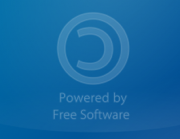pichel’s blog
activities related to Fellowship, FSFE and Free Software…
Intellectual Property as a Rainbow
December 13th, 2010
 On the 14th of November 2010, the french association “Libre Accès (fr)” (Free Access) organised a meeting to talk about the LOPPSI project (fr) and ACTA. Richard Stallman was present and made an assertion about ‘Intellectual Property”, which one could translate this way :
On the 14th of November 2010, the french association “Libre Accès (fr)” (Free Access) organised a meeting to talk about the LOPPSI project (fr) and ACTA. Richard Stallman was present and made an assertion about ‘Intellectual Property”, which one could translate this way :
In some cases of propaganda, a word is used in place of another, and this is quite simple to put the things right. For instance, they will talk about “piracy”, and I will say “sharing”. But in the case of that empty concept of “Intellectual Property” I cannot simply use another wording, the problem resides in the fact that it’s a totally forged concept, which has no substance. Wording it differently would only lead in recognizing it as relevant, which is not.
Hearing this, the old french genetician Albert Jacquard had a wonderful metaphor to describe the situation. I want to share it with you. For those of you that can understand french, here’s the original video (fr) (beware it’s a fl*sh thing !).
The metaphor of Albert Jacquard is to compare the “Intellectual Property” to a rainbow. The rainbow is not something by itself, it’s not an object of the world, but is a (beautiful) light construction that some observers may see from time to time in particuliar situations (for a physical background, one may begin by visiting the Wikipedia page).
What is special with the rainbow is that it doesn’t really exists outside the presence of an observer, even though the observer’s perceptions are totally real. But you cannot say there’s a rainbow at a particular place, the only thing you’re entitled to say is that you’ve seen a rainbow from this place at a particular time. In this respect you wouldn’t imagine pretending this rainbow could ever be “yours” and then go on the market place trying to sell it !
Going further on te track, ideas do not exist without a human thinking, and furthermore do not appear alone : what you’ve learned before, who you met and talked with will contribute to your idea. In this respect, having an idea is similar to beeing at the right place at the right moment to see the rainbow. Trying to get the on the market place is only trying to sell chimeras.
This metaphor could maybe help us in some times when advocating Free Software and sharing.
A new step for Free Software in the Vercors Natural Park
May 14th, 2010

Logo PNRV
After some Free sessions last year and the one before aimed at people, the Vercors Natural Park goes ahead a step beyond, organising an event for showing off Free Software to local communities. This Free session will take place on the 19th of May and will be targetted at people working for institutions and public communities, showing them that using Free Softawre is possible, sometimes more efficient, and fits better with the idea of a public service. Once again, I’ve been called to coordinate this day long event.
After a quick presentation of what Free Software is, we will show the benefits of a Free server, from file sharing to collaborative working, with an emphasis on where the cost goes and the advantages of contributing back to chosen projects. The afternoon will begin with a presentation of special software useful for public needs. And we’ll end that day with more one to one talks and workshop around softwares and concepts seen before, aiming at answering peculiar questions from the present people.
I’ll try to write an abstract of this day afterwards.
Michel
Net Neutrality
August 5th, 2009
Toward a new challenge for Freedom.
First, I think we should define what is Net Neutrality, not so much to play the teacher, but to put things down on the paper, and eventually get some feedback on this definition attempt.
It is difficult to give a positive definition of Net Neutrality, but let’s try to determine all what it can be for people and machines in charge of routing Internet traffic. Here’s a list of the specifications we could provide :
- Routing without caring about the content.
- Routing without privileging any address.
- Routing without privileging any protocol.
- Routing without altering the content.
1. 2. and 3. are unsufficient by themselves because you can comply to one or two of them and not compelling the third would result in a non neutral network. 4. is special, it’s about integrity of the content the network has took care of.
To sum that up in a positive sentence, let’s say :
Net Neutrality is achieved when the network transports data, dot.
All the hack will reside in what we put in that “dot”. Because network operators have real concerns about efficiency and health of their networks. Their monitoring can sometimes lead at situations where they have to take technical decisions to solve problems and make their network overall more fluid… while those technical decisions may (or may not) imply some violations of the principles stated above.
RMLL 2009 in Nantes
August 2nd, 2009
 So I was in Nantes this year to attend to the 10th edition of RMLL, a french acronym for Free Software Worldwide Meeting. The term Wordwide is a bit exagerated since most of the conferences were given in French, and that the Association Village had mostly welcome french projects. Nevertheless, it’s worth noting that about 30 % of the speeches were given in English… and that it is allways possible to speak English or French with hands, even with french people 🙂
So I was in Nantes this year to attend to the 10th edition of RMLL, a french acronym for Free Software Worldwide Meeting. The term Wordwide is a bit exagerated since most of the conferences were given in French, and that the Association Village had mostly welcome french projects. Nevertheless, it’s worth noting that about 30 % of the speeches were given in English… and that it is allways possible to speak English or French with hands, even with french people 🙂
Arriving monday in the afternoon, I was picked up by Rainer at the station, and we drove nearly two hours to reach the camping site, because of traffic jams caused by works on the road. We then discovered that driving in Nantes is often a bad option…
The booths were in a nice venue, even if organised in a too strict disposition that didn’t fit so well with opennes and diversity of people around there. More freedom, respecting security and practicability constraints would have been appreciated from many, but sure we have to recongnize it was a tough job to organize all this !
I helped Rainer at the FSFE stand the week long, despite beeing often away too because of all the insteresting conferences running all day. Every morning I came to the boss with my agenda asking for this or that schedule… with a laughing Rainer answering that I will never hold it – and it was always true :-)) We had a good help at the booth from a new Fellow from paris, Olivier which is working in a business about open and hackable devices. He held the stand few hours on Friday which aloowed me to attend to many interesting things.
This was the first time I attended such an event and held a booth for FSFE. I have to admit that I’ve been really surprised by how people got the FSFE message. I was afraid that the kind of topic FSFE deals with would seem too evaporated to people, but it was all the contrary : they seem to have empathy and sympathy for such jobs, and a good will to sustain it. The recent actuality having raised new threats for Freedom has certainly also raised people awareness about the Freedom concern that goes with Free Software. I went to talk and learn technics and I came back having talked about politics much more !
This was definitely a really good week, for us and also for FSFE which gained a lot of awareness in the french Free Software community.
Some interesting topics we dealt with :
- I had a very inresting talk with a collaborative from the City of Nantes who has been struggling for Free Software inside the office, and with the representatives for nearly seven years now ! He is still looking for material, ideas, arguments, tools to continue his battle. He’s already made some very interesting remarks and asled written questions to the representative, receiving only partial and off topic answers by now. This could be a topic where maybe FSFE could help. But it’s a huge job as every bit would have to be localized to conform local laws and habits.
- The licensing problem is one of the hottest for projects that are about to go public when having grown enough between the core developpers. I had a couple of talks with people from projects at this point. To put it short they want to distribute their piece of software now, make the stuff free… but they realise that crossing this point their level of insecurity will increase as they may have violate patents, or aren’t that much clean about their code “My stuff is Free, but I’ve used library X of which I’m not really sure of”. Well FTF is no way going to unemployment 🙂
- Part of the FSFE sympathy’s capital comes from it’s FSF like movement. Lots of people were happy to buy something from FSF’ sister organisation. So, whichever differences that happen to exist between the two organisations, the existence of a european level Free Sofware organisation is well perceived (even if they don’t perveive the inherent differences in speech and habits).
Another important topic that is not discussed here is Net Neutrality which has been extensively discussed at the political round table, but which will be the subject of another post to try to keep this one reasonable long.
Thanks a lot to Rainer that drove we the week long, while I was playing the GPS… with varying mileage :-)) Thanks and hello to all the nice guys (and girls) we met here : TuxFamily, Rhien, ubuntu-fr.org, Quimper LUG, April, FFII, and all those simple human beings with a laptop screwed under their wristles that we met, and that bring their bits of Freedom in their day to day activities.
Where Free Software is not that much about Software than about Freedom…
and I surely appreciate that !
Hadopi 2 – Democracy 2 :-)))
June 12th, 2009
Finally it’s somewhat reassuring to see that some institutions are still defending the essential principles of democracy, as they were thought 200 years ago. The Constitutional Council (approximative traduction) has finally decided that two dispositions of the voted law were disagreeing too strong with some principles. And it is interesting to understand which of them.
First of all : freedom of speech. And they haven’t gone into the constitution to defend that, but relied on the 1789’s Humans Right Declaration ! It’s 11th article states (approximately) :
Free communication of thoughts and opinions is one of the most precious human rights : every citizen has so the right to talk, write, print freely, apart from having to respond to abuse of this freedom to the extent determined by law.
The council estimated that nowadays, the freedom of talking, wrinting and printing was to be declined and extended to the freedom of publishing stuff on the Internet, and that deprivating Internet access to someone was in consequence a privation of freedom. As a consequence, such a sentence can only be pronouced by a judge and not a simple administrative commission.
Secondly, the text introduced the obligation for the acused person (which is only the owner of the Internet access) to produce the proof of his innocence. This clearly violates the principle that every person accusated of anything is to be considered as non-guilty untill the end of the judgment.
Nowadays, every politician, every buisinessman, want things to go fast, even in juridic matters, and they’re trying to automate all this. The Constitutional Council opportunately reminds them of the principles of democracy. Privating thousands of people from certain liberties in an automated way, IS NOT a democratic way of getting things done, in any manner. Dot.
A new language for FSFE’s site : Arabic !
June 4th, 2009
Have you noticed ? Since about a week, we have got a new translator, for a new language for fsfe.org : Arabic, thanks to Osama Khalid who recently joined the translators’ list asking if he could add Arabic translations. He was warmly welcome by Reinhard and started contributing right away.
Of course, the current layout with a Right-Toi-Left language looked awful ! So the web team had to make some adjustments, and finally created a small css patch for rtl, including some graphics. We can thank a lot Andreas Tolf Tolfsen who did much of it 😉
Wanna look what it looks like ? Jump to http://fsfe.org/index.ar.html ! There are still some bugs in the css, but they’ll be solved with time… and the home page is good looking now.
Hadopi 2 – Democracy 0
May 15th, 2009
Yesterday was a funny bad day. It was still funny because nobody in the coucil had Internet connection, just as if they were already applying Hadopi at it’s first day of legal existence… At least that what I answered to everybody that was inquiring me about their Internet connection 🙂
Despite of that, it was still bad, because we lost a great part of the Internet, a part that shouldn’t be lost : it’s neutrality. Covered by the duty to save big industries, the law will enforce packet filtering at the ISP level, and once the tools will be on, who will be able to point out that ISP A transports his content faster than the one from IPB B ? And that the government won’t later come in and ask them to search for any ‘terrosrist’ keywords ?
There is still hope at the european level that this law will be censored. But we have to carefully elect deputees on behalf of their awareness about Free Software. A useful tool in France is provided by candidate.fr who sent a declaration to be signed at every candidate : http://www.candidats.fr/europarl2009/ or in english if you prefer : http://www.candidats.fr/europarl2009/. Indeed, the very low amount of signature at this time leaves few doubt about the general awareness of those people on Free Software 🙁
I wonder if there are such initiative in other european countries… of course, but where ?
After all, isn’t Free Software all about Hardware ?
May 8th, 2009
Yes, another silly question you may think !
And you’d certainly be right in an ideal world made of Free hardware, open specs, and so on. But we aren’t, we are in the world of Hardware, deeply propriatery Hardware !
People tend to get more and more open to Free Software : they’ve heard about it, some of them tried it, other use some popular softs like OpenOffice or Firefox in their daily use of a computer. Why are those software so popular ? Just because they run on every platform you may find (OK, not only, also because they are very good software, but you already know this :-). The price is often statically linked libraries, but who cares except some nerds at the cost of broadband today ? What is important here is that you can totally abstract from hardware with those softwares, and nearly from the underlying OS.
Things get worse when you want to connect a printer to your brand new GNU/linux desktop. Even if most of the time you can click along “Add a printer” in a prefpane and get it work, there are some cases where this won’t work as simple. Here you loose your potential switcher which is afraid from what has to be done to get it work, or worse if the answer falls on “you’ll have to wait for someoneto write the driver, or write it yourself”. Yes, it’s partly the user’s fault because he thought he made a bargain buying this cheap d**l printer for an extra euro with his computer. But the fact is : even if he’s first thought was to throw away the original system, he’s now locked in by this little piece of hardware that has no Linux driver.
Things will go the same way with a scanner, digital camera, webcam, phone, pda… and every imaginable (or not) piece of hardware that one owns and want to use along with his computer. The longer the list, higher the probablility to find one that is not functionnal under GNU/Linux, or not fully, or without the support of this killer feature that made the appliance interesting.
If one would buy things when needed it wouldn’t be really a problem : one would search for a “compatible” model, et voilà ! But as the world goes, people tend to buy things because of mental images they made of them, or their use… et patatras, the dream flies away in the sky.
So using Free Software is also a way of consuming, and more precisely of less consuming. In running Free OSes, you learn to run away from advertising and to make opinions about things before buying them. You learn to go for Hardware made by people that are aware of Free Software and that write good drivers or at least give good specs on their hardware. In fact this simplifies a lot what and where you buy !
Finally, spreading Free Software, is also finding good hardware to spread it on. When you are given closed hardware, often you can’t go further with Free Software because you won’t get it working properly, or this would require too much work for what it’s worth… except with the help of the community of course, which solves many of those situations, but not all, far from that.
GNU/Linux at the public library !
April 27th, 2009

Powered by Free Software
At the beginning of the month I was called by the Community Council to provide them with an estimate for taking three “old” computers and installing them to the public library of the council. A great opportunity to make the public in touch with GNU/Linux and Free Software… so said my estimate that was approved.
Now I’m about to ship 2 of the 3 machines, not that old at all (Dell Dimension 4600 with 2,4 GHZ PIV inside and 512 Mb RAM !), that will run perfectly under Gnome (and could certainly do the same with KDE… if only I was a KDE addict :-), the third beeing desesperately out of order. One will go in an office, the other will serve as public access to Internet and also to the library’s database via a web connection.
I had some investigations to do in order to get a reproductible and enough locked public machine. I first thought about sabayon, but be in Debian or Ubuntu the package is desesperately broken at this time. The good news about this is that I’m currently learning python so I’ll certainly be able to fix the problem for the next century release (yes I’m slow at learning). So I fell back into GnomeConf and Pessulus for the locking of the Desktop, a cool Firefox extension called Public Fox to get an acceptable result. Last touch was to prepare the menus, put a cool wallpaper claiming for Free Software, and other minor adjustments. The reproductibility of the setting is done by a rsync on the home folder that I just rsync back after a brand new installation, and a good package list got by dpkg –get/set-selections.As a result it’s nos that automatised, but good enough for my needs : the next computer will be setup in an hour.
I’m glad that in the next weeks, the best computer to browse the Web at the library will run on GNU/Linux with only two non-free software : the flash plug-in, and google earth. Those are here to present a computer that will be able to show off, and will not give the feeling that Free OSes aren’t able to browse on Utube that could be falsely interpretated that they cut you from parts of the Web and Internet experience.
Let’s now wait for the next machines that will forcibly come since I still haven’t managed to get the council switch to GNU/Linux… so they’re still buying new machines to be able to follow up the “new” versions of their software. If it’s bad on one side, it’s still good on the other beacause they are forced to give away better computers every day 🙂
HADOPI rejected by French Assembly !!!
April 11th, 2009
Finally and how surprising, the HADOPI law project was rejected yesterday by the french assembly !
Of course there weren’t many deputees present at the moment of the vote (21 against and 15 for which gives 36 people present out of 577… no comment), but this shows that all the buzz and reactions against this law project may finally have had some influence on the deputees.
The story is not over since the project will be presented again at the next session on the 28th of April.
If you want to learn more about the subject, and even if you only speak english, you will find this page useful : La Quadrature du Net.